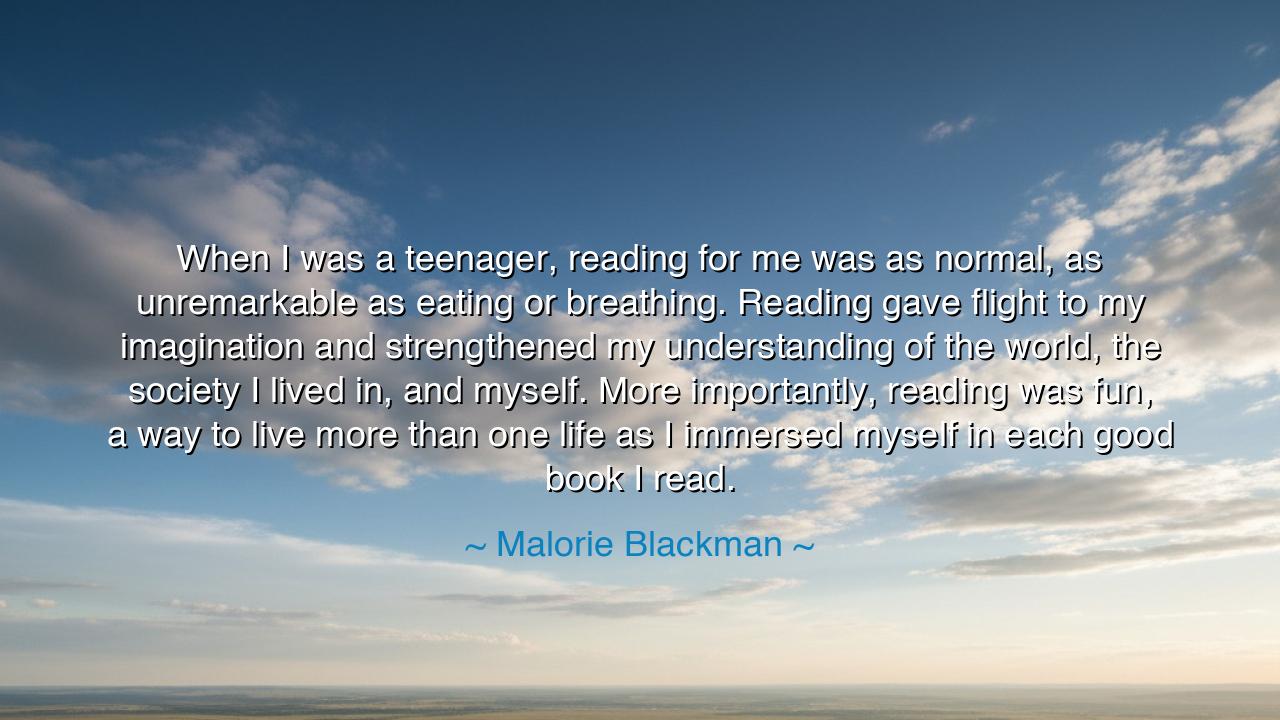
When I was a teenager, reading for me was as normal, as
When I was a teenager, reading for me was as normal, as unremarkable as eating or breathing. Reading gave flight to my imagination and strengthened my understanding of the world, the society I lived in, and myself. More importantly, reading was fun, a way to live more than one life as I immersed myself in each good book I read.






When Malorie Blackman said, “When I was a teenager, reading for me was as normal, as unremarkable as eating or breathing. Reading gave flight to my imagination and strengthened my understanding of the world, the society I lived in, and myself. More importantly, reading was fun, a way to live more than one life as I immersed myself in each good book I read,” she spoke with the voice of one who has known the secret nourishment of the soul. Her words are not merely a recollection of youth, but a hymn to the power of reading, that sacred art through which the mind expands beyond the boundaries of its birth and the spirit learns to wander free.
The origin of this reflection lies in Blackman’s own life, a journey marked by curiosity, resilience, and vision. Growing up in South London, she found in books a gateway to other worlds—places where her imagination could soar, even when the real world seemed narrow or harsh. Through reading, she learned to see not only what was, but what could be. It taught her empathy, courage, and the infinite possibilities of thought. From those early pages she drew the strength that would later shape her voice as one of the great storytellers of her generation. In her words, the imagination becomes both a lantern and a ladder—a light that reveals, and a bridge that lifts the soul toward understanding.
When she says that reading was “as normal as eating or breathing,” Blackman reminds us that reading is not a luxury, but a necessity of the mind. Just as the body hungers for food, the spirit hungers for story. Every tale we encounter feeds the inner self—some offering sweetness, others strength, still others the sharp taste of truth. To read, in this sense, is to live deliberately; to drink deeply from the stream of human experience. The one who reads partakes in the great communion of minds that stretches across centuries. Through each book, we share in the dreams of the living and the dead, and thus our own life grows larger than its years.
But Blackman’s insight reaches further still. When she speaks of reading giving “flight to her imagination,” she touches upon the divine faculty that separates mere existence from creation. For imagination is the winged power of the human spirit, allowing it to transcend the boundaries of time, place, and circumstance. In the hands of youth, it is the beginning of all freedom. Through stories, the young learn to dream—to question the limits imposed upon them and to envision new worlds of justice, beauty, and love. In the quiet act of reading, the future itself is born, for every page turned plants a seed in the soil of the mind.
Consider the story of Frederick Douglass, who, as a slave in nineteenth-century America, risked his life to learn to read. To his oppressors, words were dangerous weapons; to him, they were wings. Once he had tasted the power of the written word, he said, “I understood the pathway from slavery to freedom.” Through reading, Douglass discovered the boundless world of ideas and the infinite strength of his own soul. Like Blackman, he learned that books are not merely objects—they are doorways to selfhood and liberation. They teach us who we are, and who we might yet become.
In saying that reading helped her understand “the world, the society, and herself,” Blackman reveals the three mirrors of literature. The first reflects the world, showing us the vastness of creation and the diversity of human experience. The second reveals society, helping us see its structures, its injustices, its hidden harmonies. And the third, most intimate mirror, reflects the self—our fears, our hopes, and our capacity for change. Through reading, these three mirrors converge, until we perceive that the boundaries between them are illusions: to understand the self is to understand the world; to understand the world is to grow in compassion for others.
And then, in the simplest and most profound of her truths, she says that reading was “fun.” Here lies the heart of it all. For wisdom without joy is dry, and knowledge without wonder is dead. The joy of reading—the delight of discovery, the thrill of immersion—is what keeps the spirit alive. It reminds us that learning is not a duty but a dance, not a burden but a blessing. To read for joy is to affirm that the imagination is sacred, that curiosity is holy, and that the soul, like a child, must be allowed to play.
So, my listener, take this wisdom as both remembrance and command: read. Read not only to know, but to feel; not only to escape, but to return transformed. Let reading become as natural to you as breath, and let each book you open feed your imagination and strengthen your heart. In an age that rushes past reflection, be one who pauses to listen—to the voices of poets, philosophers, and storytellers who came before you. For as Malorie Blackman teaches, every good book is another life waiting to be lived, another light waiting to be kindled. And the one who reads deeply, lives endlessly.






AAdministratorAdministrator
Welcome, honored guests. Please leave a comment, we will respond soon